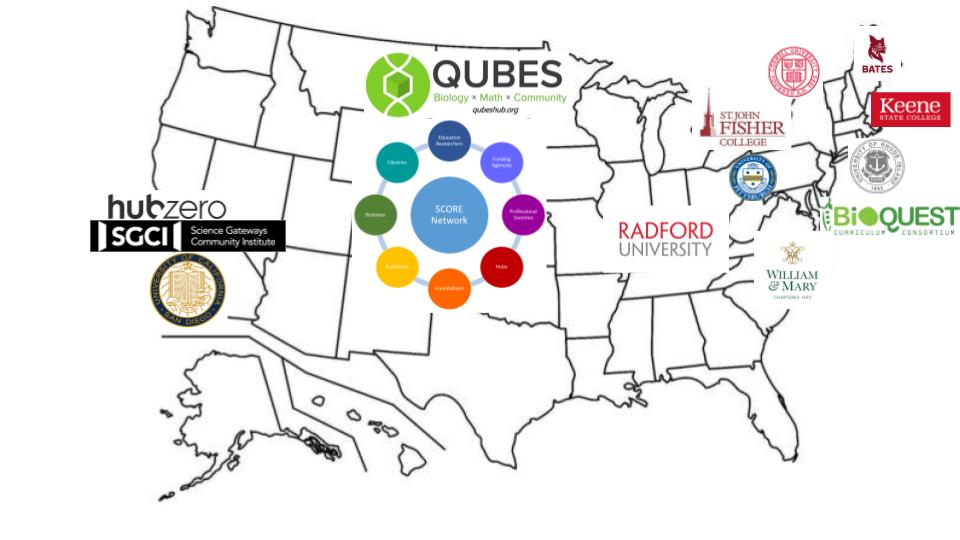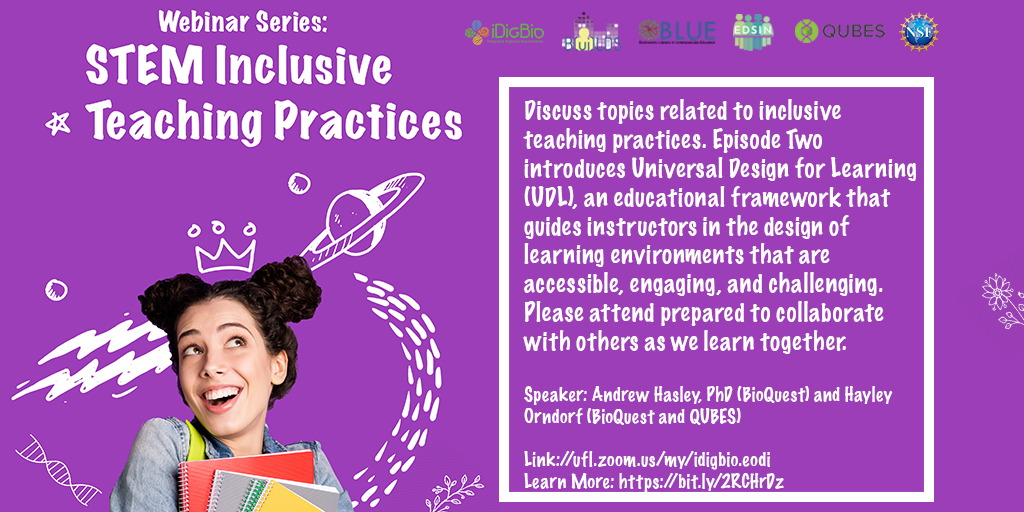
These weekly, mini-Newsletters were intended to provide resources to support the community during the rapid, nationwide transition to faculty completing courses online. As the semester closes down, next week will be our last weekly newsletter. Join us as we reflect on the successes of the last few months, and think about next steps as we plan for fall.
In this issue, learn about
Teaching Quantitative Biology Online: OERs, Forums, and Community

Resources for Teaching Quantitative Biology Online is a collection of open education resources (OERs) that are designed to teach quantitative skills in a variety of biological contexts and will work well in an online setting with minimal adaptation. This webpage is a rapid response to the need for our community of educators to move learning online quickly.
Too Much Content Available? Scan the Resource Walkthroughs! Resource Walkthroughs provide a quick video description and teacher discussion on resources available for use. These discussions are led by the content creators or a teacher who has used them often. These videos give viewers a practical overview of how to use the materials online. See here for more information. Reach out to Deb.Rook@bioquest.org if you would like to produce a video guide to your content.
QUBES partners and individuals can share and highlight modules, as well as indicating adaptations made to existing OERs. Resources (like those listed below) are posted often. Join the group to contribute your own ideas! We expect this resource to grow quickly, as we update and prepare for fall. Check back often.
Grant from the Hewlett Foundation to expand Inclusion and Diversity Focus
The Hewlett Foundation award will support SCORE organizations who will pilot shared practices for sustainability, as well as support, invite, and expand the community of educators and OER organizations to align universal design for learning and inclusivity goals with classroom and organization practice. To move OER intentionally toward a social justice, equity, diversity, and inclusive framework, we intend to normalize these conversations and weave practices into organizational missions, curriculum development, and delivery.
 The Hewlett Foundation recognizes a challenge to Open Educational Resources (OERs) is how to keep an eye on equity and inclusion while simultaneously keeping efforts financially sustainable! Following the work of SCORE, Bates College and QUBES, the Hewlett Foundation has recently awarded Bates a one year grant to support implementation of several collaborative projects that began at the SCORE Summit (October 2019, Bates College). The Sustainability Challenges for Open Resources to promote an Equitable Undergraduate Biology Education (SCORE-UBE) Network explores the promise of equity and the realistic challenges of sustainability assumed by open educational resources (OER) in undergraduate biology education, broadly defined to include open access publications, software, and digital platforms that enhance college biology instruction. The Hewlett Foundation recognizes a challenge to Open Educational Resources (OERs) is how to keep an eye on equity and inclusion while simultaneously keeping efforts financially sustainable! Following the work of SCORE, Bates College and QUBES, the Hewlett Foundation has recently awarded Bates a one year grant to support implementation of several collaborative projects that began at the SCORE Summit (October 2019, Bates College). The Sustainability Challenges for Open Resources to promote an Equitable Undergraduate Biology Education (SCORE-UBE) Network explores the promise of equity and the realistic challenges of sustainability assumed by open educational resources (OER) in undergraduate biology education, broadly defined to include open access publications, software, and digital platforms that enhance college biology instruction.
Read the full post on the QUBES blog!

Please join us on May 13, at 3:00 pm ET at this Zoom Link.
Episode Two will introduce Universal Design for Learning (UDL), an educational framework originally developed by CAST that guides instructors in the design of learning environments and educational materials that are accessible, engaging, and challenging for all students. This episode will also offer attendees the opportunity to practice identifying and applying UDL principles to classroom activities. As this episode is designed to be interactive, please attend prepared to collaborate with others as we learn together.

SimBio Extends Open Resources Through Fall
SimBio Major Offering Free through Fall. SimBio developed How Diseases Spread - Epidemiology Explored before the current pandemic, but because of its very direct applications, SimBio offered it for free for instructors to use in any college courses impacted by the pandemic this spring. The response we received has been overwhelmingly positive.
Given the current uncertainty about how and when undergraduate institutions will re-open for traditional in-class teaching, they are now extending the free offer through FALL term. To find out more, you can look at our How Diseases Spread webpage.
SimUText Ecology Series. SimBio also continues to offer webinars on our SimUText Ecology series every Thursday at 1:00 Eastern (signup: https://simbio.com/teaching-simutext-ecology-webinar-registration) and SimBio Labs every Friday at 2:00 eastern (signup: https://simbio.com/webinars/intro-labs)
Moving a Project to a Collaborative Space? How can QUBESHub help?
Use this 6-question survey to communicate your needs for planning. The QUBESHub Team will respond, helping to support you to take your conference or project online.
Members of the QUBES team are participating in some re-imagined conferences that will be happening through the QUBESHub. Members of the QUBES team are always looking to meet others who have a passion for quantitative biology education. Reach out so we can help you gather your collaborators, move projects forward, and continue to move quantitative biology forward. Connect with us by submitting a support ticket

From left to right: Sam Donovan (Director of OER), Carrie Diaz Eaton (Director of QUBES Consortium), Kristin Jenkins (Director of BioQUEST), Drew LaMar (Director of Cyberinfrastructure), and Jeremy Wojdak (Director of Professional Development).
Do you have a product or result from a QUBES sponsored activity? Help us measure our success by sharing your product or result with QUBES. Learn how to cite QUBES.
|